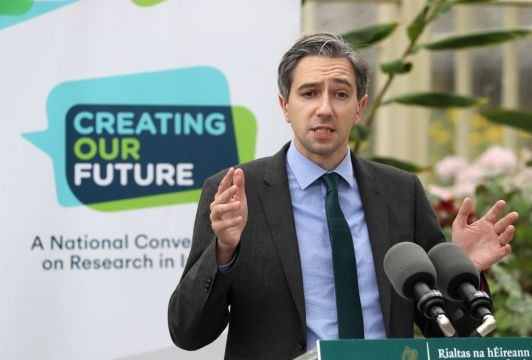Minister for Further Education Simon Harris has questioned if the Leaving Certificate points race is “the right way to go”.
Mr Harris said the pathway between secondary and third level education was “not the international norm”, and said the country should be “braver, bolder, and more ambitious”.
A new policy is to be implemented in November that will see students use the CAO system to apply not just for university places, but for further education and training courses, and apprenticeships too.
He said: “Is the Leaving Cert the right way to go? I’m not sure it is.
“Is it right that we have this points race in Ireland, where we convince ourselves this is the international norm? It’s not.
“Why don’t we assess the students on their interest or background?
“You know, you could be bad at certain subjects that you must do in secondary school, and you can still make a really good doctor.”
'There is a better way'
He added: “My job is to say, can we come up with a much better system, where the 17-year-old in the school isn’t just having this narrow conversation where they’re told ‘which university do you want to go to?’
“Not ‘what would you like to do with your life?’, not show them all the pathways and not factor in other things other than points.
“I hope one of the good things to come out of Covid, if we’re brave enough and bold enough as a country, and all the education partners, should be to say there is a better way, there must be a better way.”
Mr Harris said the race for college places had created “skills shortages in key areas of the economy and the society”.
“We’re talking about building houses. My colleague, Minister Eamon Ryan, is talking about retrofitting houses” he said.
“We have an emergency when it comes to climate. Who do people think are going to build these houses? Who do people think you’re going to retrofit these homes?
“If we don’t start now, today, talking in this country and getting rid of this academic snobbery that we have, this cultural attitude that we have towards third level…
“It is not the norm internationally, it has created skills shortages in key areas of the economy and the society.
“We have to be here to do something radical and reforming in relation to this.”
Think differently
Speaking separately, Minister for Education Norma Foley said that the pandemic has created an opportunity to think differently about the Irish education system and the Leaving Certificate.
“I also do think, and I say this consistently, that the time is now opportune as well for a greater and a bigger look at Senior Cycle,” she said.
Ms Foley said: “There is an opportunity now to take a root and branch look at everything.”
It comes as this year’s Leaving Cert saw record high grades, with CAO points shooting up amid unprecedented demand for college places.
Many of those who achieved maximum points will miss out on their chosen course this year, as limited places mean a process of random selection will be used to determine which students get in.
There won’t be any more places
Chair of the CAO and NUI Galway Professor Pol O Dochartaigh has described the process as “unfair”.
Mr Harris has ruled out creating more college places to alleviate this.
He said: “The honest answer is we’ve already provided a record number of new college places this year.
“There has never been a year before in the history of our state where more people have got offered a place in college than there is this year.”
He added: “It’s very much in line with previous years. So there won’t be any more places.”
Mr Harris was speaking on Wednesday at the launch of the Government’s Adult Literacy for Life programme, a new initiative to help those struggling with literacy, numeracy and digital skills.
At the launch of the #AdultLiteracyForLife Strategy today Minister @SimonHarrisTD said:
"Everyone knows that education is a great leveler, we know that literacy is power and it’s our job to empower everyone in Ireland to be their best possible selves." pic.twitter.com/AKQy0ll6p1— NALA celebrating over 40 years (@nalaireland) September 8, 2021
One in six adults in Ireland lack basic reading skills, one in four lack basic number skills while one in two lack basic digital skills.

Mr Harris said: “We can’t ignore this problem any longer.
“The aim is over the next 10 years to make huge progress. To go from 18 per cent of people lacking basic reading skills, to get that down to 7 per cent.
“To go from 25 per cent of people lacking basic number skills, and get that down to 12 per cent, and basic digital skills, to go from that 50 per cent to 20 per cent.”







